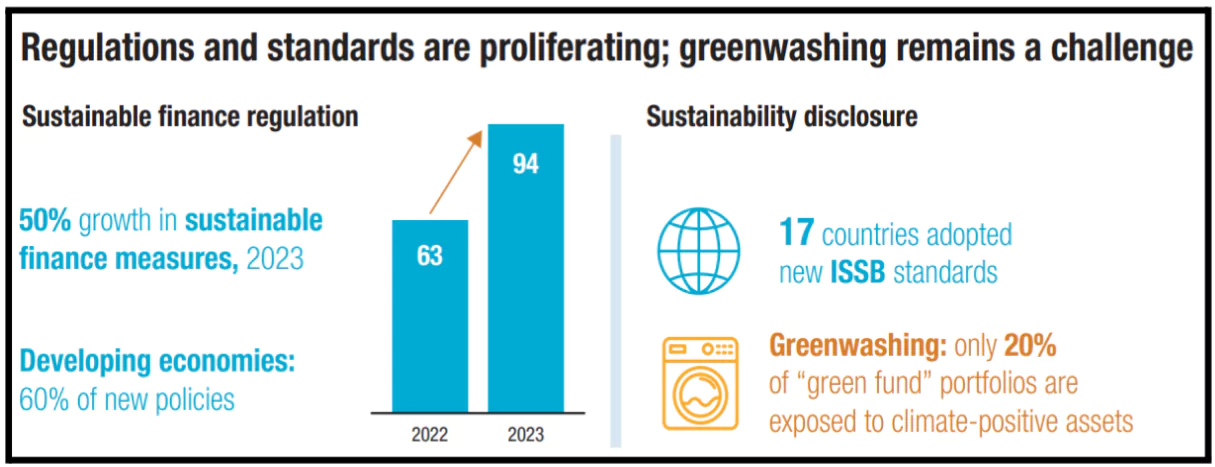Recently, the United Nations Conference on Trade and Development (UNCTAD) has released the World Investment Report 2024.
World Investment Report
- About: The World Investment Report focuses on trends in foreign direct investment (FDI) worldwide, at the regional and country levels and emerging measures to improve its contribution to development.
- It also provides analysis on global value chains and the operations of multinational enterprises, with special attention to their development implications.
- Components: Every issue of the Report has:
- Analysis of the trends in FDI during the previous year, with especial emphasis on the development implications
- Ranking of the largest transnational corporations in the world.
- In-depth analysis of a selected topic related to FDI.
- Policy analysis and recommendations.
Enroll now for UPSC Online Course
Key highlights of the latest World Investment Report 2024
- Global Foreign Direct Investment (FDI) Decline in 2023
- Overall FDI Decrease: Global foreign direct investment (FDI) fell by 2% to $1.3 trillion in 2023 due to an economic slowdown and rising geopolitical tensions.
- Impact on Sustainable Development
- Sustainable Development Goal (SDG)-Linked Investment: Investment in sectors related to the Sustainable Development Goals (SDGs) fell by over 10%.
- Greenwashing Concerns: Misleading sustainability claims are increasingly affecting investor demand.

- Global Impact of New Sustainability Disclosure Standards: New disclosure standards from the International Sustainability Standards Board (ISSB) and the European Union (EU) will affect firms outside the primary financial markets.
- Companies in developing countries, especially those in supply chains for these markets, will face increased pressure to meet higher sustainability standards, with compliance potentially becoming essential for market access
- Financing Challenges and Project Finance
- Project Finance Decline: Tight financing conditions led to a 26% decrease in international project finance deals, crucial for infrastructure investment.
- Regional FDI Trends
- Developing Countries: FDI flows to developing countries fell by 7% to $867 billion, with an 8% decrease in developing Asia.
- China: The second-largest FDI recipient, China, experienced a rare decline in inflows.
- India and West & Central Asia: Both regions saw significant drops in FDI, while South-East Asia remained steady.
- Vulnerable Economies: FDI flows to structurally weak and vulnerable economies increased.
- Investment Policies and Agreements
- Policy Measures: New investment policy measures declined in 2023, though most were favourable to investors.
- International Agreements: In 2023, countries and regions concluded 29 new international investment agreements (IIAs).
- International investment agreement (IIA) is a type of treaty between countries that addresses issues relevant to cross-border investments, usually for the purpose of protection, promotion and liberalisation of such investments.
- The number of international investment agreements continued to decline.
- Investment Facilitation Progress
- Online Single Windows: Since the launch of the global action menu for investment facilitation in 2016, online single windows in developing countries increased from 13 to 67, and in developed economies from 12 to 28.
Check Out UPSC CSE Books From PW Store
India Specific Points
- Decline in FDI Inflows: FDI inflows declined for most reporting economies.
- Among the top 20 host economies, the largest absolute drops were registered in France, Australia, China, the United States and India, in that order.
- India’s Foreign Law Practice Policy: India permits foreign lawyers and law firms to “practise foreign law within the country” (i.e. to advise clients on the international elements of mergers and acquisitions or appear as arbitrators).
- Sustainable Finance Initiatives: In 2023, seven of the developing countries (Argentina, Brazil, China, India, Mexico, Türkiye and the United Arab Emirates), together with ASEAN member States, rolled out national strategies or frameworks on sustainable finance.
Call of Action provided by the UNCTAD
- Promoting Investment and Business Facilitation: Countries should create a transparent and streamlined environment using business facilitation and digital government tools.
- Boosting FDI for Infrastructure: Encourage institutional investors to increase FDI flows into infrastructure projects, particularly in developing countries, to support long-term economic growth.
- Sustainable Development Investment
- Government Promotion: Governments should promote investment in sustainable development projects through outward investment measures and international agreements.
- Fossil Fuel Divestment: Institutional investors need to set ambitious targets for divesting from fossil fuels and increasing investments in renewables.
- Addressing Greenwashing
- Combat Greenwashing: Implement systematic efforts to address greenwashing through well-defined product standards, robust sustainability disclosures, external auditing, and third-party ratings.
- Reforming International Investment Agreements (IIA): International organisations and governments should accelerate efforts to reform the IIA regime to reduce the risks of investor-state disputes, particularly for developing countries.
- Aligning Investment with SDGs: Countries and institutions should encourage investment regimes aligned with the Sustainable Development Goals (SDGs).
- Digital Government Tools
- Bottom-Up Approach: Adopt a bottom-up approach to digital government tools, starting with basic services for businesses and gradually expanding to more institutions to capture economies of scale.
- Technical Support: International organisations should provide technical support to developing countries to build and enhance digital platforms, leveraging development assistance as needed.
Enroll now for UPSC Online Classes
UN Trade and Development (UNCTAD)
- About: It is a permanent intergovernmental body established by the United Nations General Assembly in 1964.
- Headquarters: Geneva, Switzerland
- Part of: UNCTAD is part of the UN Secretariat and United Nations Development Group.
- Reports to: It reports to the UN General Assembly and the Economic and Social Council.
- Other Reports: Other reports published by UNCTAD:
- Commodities and Development Report
- Trade and Development Report
- The Least Developed Countries Report
- Information and Economy Report
- Technology and Innovation Report
|
![]() 17 Aug 2024
17 Aug 2024

